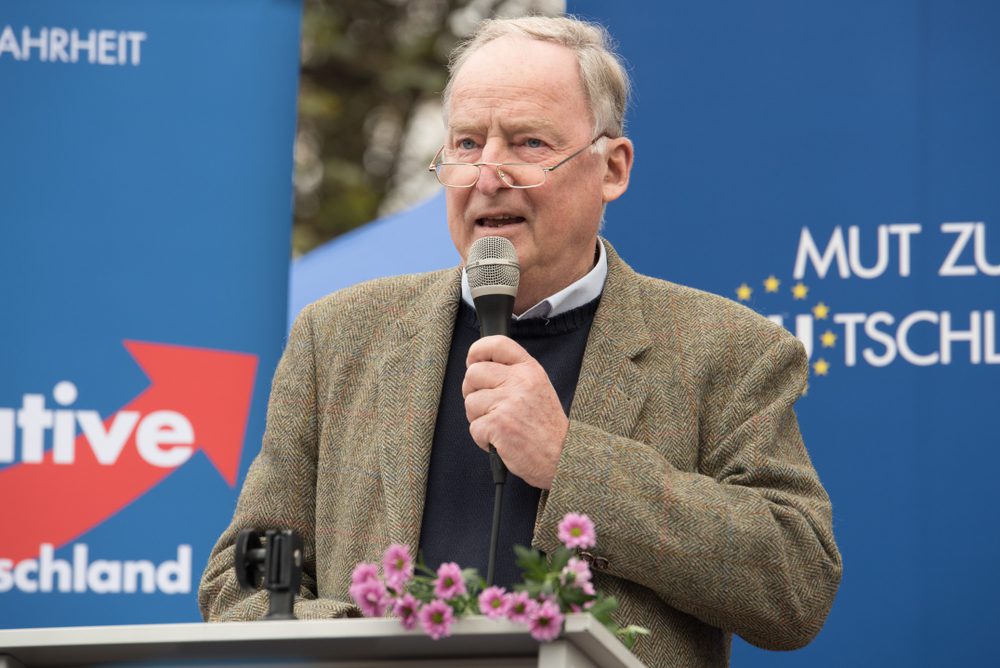
Alexander Gauland is the leader of the right-wing political party Alternative for Germany.
Against all odds—and in the face of the full might of the country’s entrenched political and media establishment—the Alternative für Deutschland (AfD), Germany’s most staunchly right-wing party, continues to witness its popularity expand, with the latest poll showing that its support level, once again, has reached a new all-time high.
The opinion poll, carried out by Infratest Dimap for ARD and WELT, revealed, among other things, that the German people’s satisfaction level with the federal government has dropped to a new all-time low, with 79% of citizens reporting being “less” or “not at all” satisfied with the ‘traffic light’ coalition, a 10% jump compared to last month.
BUNDESTAGSWAHL | Sonntagfrage Infratest dimap/ARD
— Deutschland Wählt (@Wahlen_DE) June 1, 2023
Union: 29% (+1)
SPD: 18%
AfD: 18% (+2)
GRÜNE: 15% (-1)
FDP: 7% (-1)
LINKE: 4% (-1)
Sonstige: 9%
Änderungen zur letzten Umfrage vom 11. Mai 2023
Verlauf: https://t.co/f9MV7iZ8iJ#btw #btw25 pic.twitter.com/QJWtHXnRLx
Presently, a mere one in five Germans is satisfied with the work of the Scholz government.
The poll, the second in less than a month to put the AfD in second place at the federal level, has revealed that if elections were held today, the party would collect 18% of the vote, tied with Scholz’s SPD and ahead of both the Greens and the FDP, which would garner 15% and 7%, respectively. The 18% figure is the highest ever recorded by the AfD in a national poll since it became a party more than a decade ago.
The AfD and the CDU, in a hypothetical coalition, would enjoy the support of nearly half (47%) of the German electorate.
The poll’s figures clearly indicate that—similarly to what has been witnessed in Austria with the FPÖ—increasingly broad swaths of German society agree with the AfD’s anti-establishment policy positions on the war in Ukraine, migration, and energy and climate policy.
Commenting on the figures, AfD MP Petr Bystron, who serves as the party’s foreign policy spokesman, told The European Conservative:
The development is fully in line with the pan-European trend, populist parties are on the rise everywhere. This is also shown by the latest election results from Spain, where VOX has grown strongly.
Unlike the mainstream parties—those in the ruling coalition along with the CDU—the AfD opposes weapons shipments to Ukraine, calling instead for a cease-fire and peace talks. With respect to migration, the party is the only one that advocates for stricter border controls and limiting the vast inflows of foreign nationals. And lastly, the AfD is the only party to strongly position itself as an opponent of the ‘traffic light’ coalition’s climate and energy policy.
Of those survey respondents who support the AfD, 32% stated they vote for the party because they find their arguments convincing, while 67% do so because they are “disappointed with the other parties.”
At the moment, the AfD is represented in 14 of the 16 state parliaments and is the strongest political force in East Germany—home to more than 16 million people.
The survey’s results come alongside a study published on Wednesday, May 31st, by the Center for Civil Society Development (ZZE) and the Allensbach Institute for Demoscopy that revealed Germans, especially those living in the eastern part of the country, are increasingly pessimistic over the functionality of their democracy. Around 35% of those who were surveyed in the former East German federal states reported feeling “politically powerless” to affect the change, the study found. The figure was particularly pronounced among AfD voters, at 65%.
